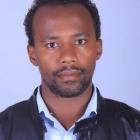
Research and policy advisor | Associate | IRC Ethiopia
Ephraim Mebrate Disasa is an associate to IRC since 1 October 2021. Prior to that Ephraim was a Research and Policy Advisor to IRC. Before joining IRC in 2019, Ephraim had been working in an International NGO, Higher Academic Institutions and Psychiatric Hospital for the last 10 years. Ephraim has track record for Market and Health Research in areas of WASH, FP, HIV, Nutrition and Mental Health. During his five and half year stay at PSI/Ethiopia, Ephraim conducted wide arrays of market and health researches geared towards programme improvements and policy influencing.
Ephraim did his baccalaureate and graduate studies from Addis Ababa University in Sociology and Social Anthropology and Social Work in Health Care Setting where he graduated with very great distinction.
A briefing note on the use of cellular and satellite connected sensors for near-time monitoring of rural water services in Ethiopia. Read more...
A discussion on ways to use existing systems to improve scale and sustainability of hygiene promotion efforts. Read more...
Existing models used for financing water infrastructure development do not seem very applicable to the realities of small towns. Read more...
Neither rural sustainability checks, nor urban benchmarking frameworks, are entirely suitable for monitoring small town water services. Read more...
This report reviews the landscape of technologies, methods, and approaches that can support and improve on the water and sanitation indicators... Read more...
Video recording of a webinar on the findings of a landscape study on the use of monitoring frameworks for the assessment of WASH systems. Read more...
Innovative mechanisms for the financing of capital maintenance of piped systems in Ghana may not necessarily fix the problems of poor service... Read more...
Possessing a non-shared latrine neither guarantees safety to its users nor its categorisation as 'improved'. Instead, the state of the latrine, the... Read more...
Projects that integrate water, sanitation and hygiene (WASH interventions, climate resilience and fresh water conservation are more efficient and... Read more...
This learning note summarizes a study commissioned to map examples of public-private collaboration in consumer sanitation markets from around the... Read more...
This document sets out some of the main service authority and service provider functions required for delivery of sustainable rural water supply... Read more...
Burkina Faso was unable to generate full funding for its previous national programme to achieve the Millennium Development Goals (MDGs), falling... Read more...
A lack of sanitation access in the community is a significant risk factor for anaemia and child growth stunting, but not for incidence of diarrhoea... Read more...
This document is a guide to orient UNICEF country staff to support governments to strengthen the water, sanitation and hygiene (WASH) enabling... Read more...
This working paper reviews the institutional setup and financial flows for water supply and sanitation in the commune of Houndé, Burkina Faso. Read more...
Paper underlining the importance of learning for better performance in the WASH sector and to contribute to the discussion on how this can be... Read more...
The purpose of this report is to give an impression of the proceedings and discussions that took place during the first SEHATI Programme Coordinators... Read more...